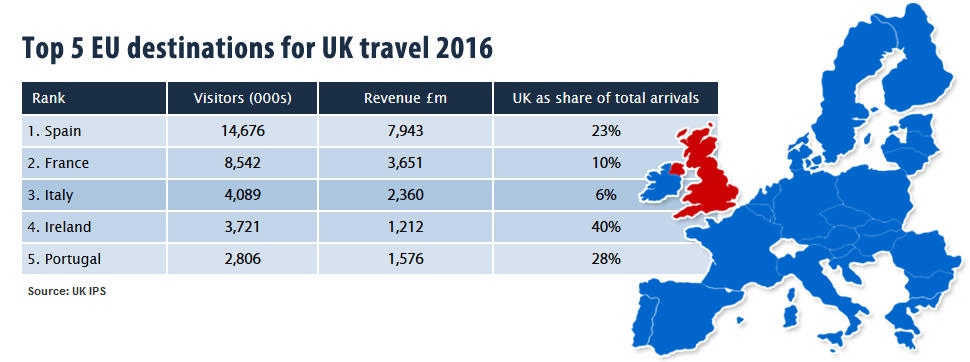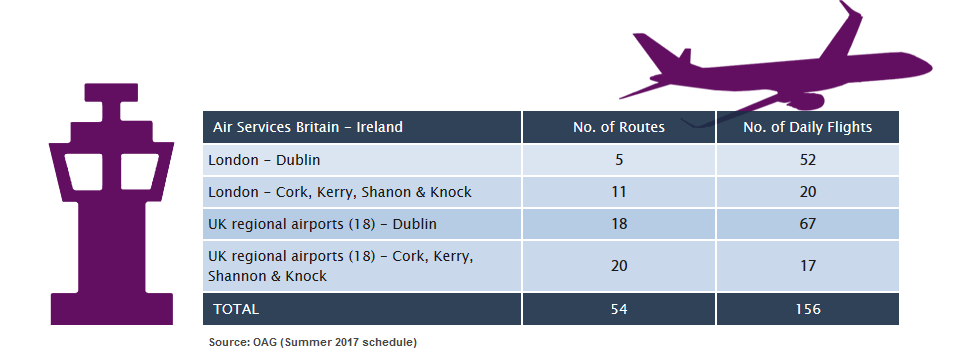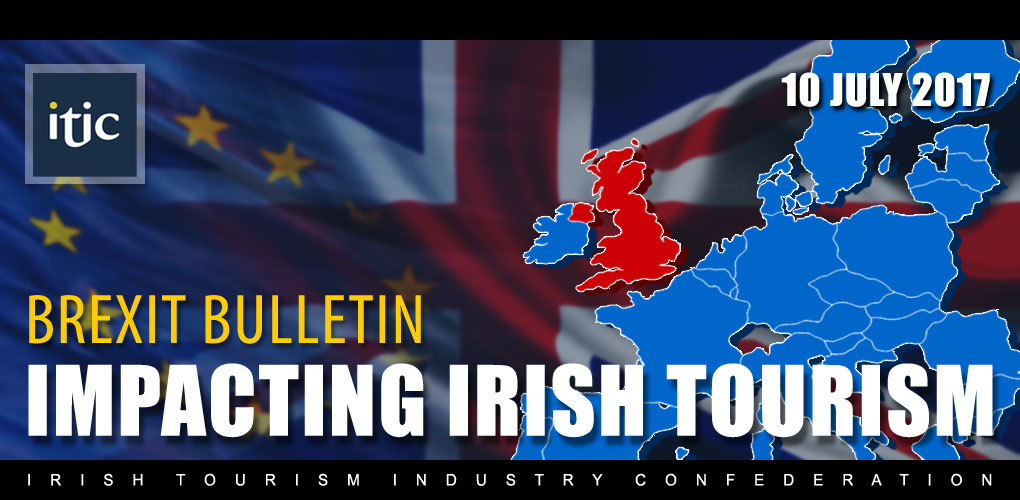
Brexit negotiations: Putting Ireland’s dependency on British tourists
into
perspective
A primary issue for Ireland’s tourism industry is protecting its No.1 volume source market. However, Ireland is not the only EU member state with a high degree of dependency on the UK outbound travel market. The UK is also the top source volume market for tourism in several countries, notably Spain, Portugal, Cyprus and Malta, and a valuable component of inbound tourism to many other EU 27 destinations. Spain, the top destination for UK travel, with almost 15 million trips last year, is also home to an estimated 300,000 British people in addition to a further large number (variously estimated at close to 500,000) who spend at least part of the year in mainland Spain and the Canaries. Spain has been actively lobbying on the travel related issues in Brussels and with other EU member states.
While Ireland may be relatively more dependent on the UK as a source market, the scale of demand and value of UK tourists is considerably greater for other EU members. Ireland ranks 4th in terms of volume of British visitors to EU destinations, and 5th in terms of revenue. Ireland’s ranking falls to 7th in respect of holiday travel from Britain, with the Netherlands and Greece each currently attracting a greater number of UK holiday visitors.

In addition, Malta, Cyprus and Gibraltar are each highly dependent on UK visitors, with 80% of visitors coming on holiday.
- Malta, where tourism accounts for 15% of GDP, the UK is the top source market accounting for just over 33% of arrivals – est. 651,000 visitors, spending over €500 million in 2016.
- Cyprus welcomed an estimated 1.16m UK visitor in 2016, spending over €650m, representing 36% of the island’s arrivals and just over 30% of tourism revenue.
The scale and value of the UK outbound travel market will ensure that travel and tourism related issues will be high on the agenda of other EU member states during the negotiations.
PRIORITY 1: The preservation of the Common Travel Area (CTA) and a soft border;
The threat of a disruption to the Common Travel Area – whereby visitors can move freely between the UK and Ireland - is the top concern of the tourism industry. The objectives of securing continuation of the common travel area have been well publicised.
The UK’s demand for control over the movement of people poses a threat to the travel and tourism sector. The outcome of the UK’s negotiated withdrawal from the common market and customs union will be key to how migration controls will be implemented in the future. There are potentially many scenarios regarding a post Brexit relationship between the UK and the EU which will determine the scope and level of controls over the movement of people and goods.
As Ireland and the UK are not part of the Schengen travel area in respect of border controls it is hoped that the CTA can be preserved. Thanks to the Government in securing the border issue in the EU negotiation guidelines, it is important that progress can be made alongside the issues of EU citizens’ rights and the size of Britain divorce bill before there can be any discussion about the future relationship between the UK and the EU and any trade agreements.
An importance aspect of the CTA is the current reciprocal visitor visa arrangement in place between the UK and Ireland whereby approved visa holders can visit both countries, which has worked to the benefit of Ireland’s tourism industry. However, depending on the outcome of the Brexit negotiations on the issue, it may be in Ireland best interests to reevaluate the potential benefits of capturing a great share of the visitors from new emerging long haul markets who arrive in Europe via a gateway in the Schengen travel area.
It is to be highly desirable that a frictionless border solution can be found, including the application of technology, which would minimise any disruption to cross- border tourisms flows between both parts of the island. However, the EU’s chief negotiator, Michel Barnier pointed out on a recent visit to the border area that it will become a land border with the EU with consequences for customs controls as part of the EU management to protect the single market, safety and standards for food and other goods.
The introduction of new controls on the movement of people between the UK and Ireland, including the land border, would have serious consequences for the travel and tourism industry. The maintenance of the current CTA is seen as a priority to the industry’s sustainable growth. The reintroduction of land border controls would have serious implications for tourism businesses in the border region, particularly in Donegal.
PRIORITY 2: The retention of a liberalised aviation regime between the UK & Ireland, and avoiding the possible risk of disruption of air services.
Potential disruption to the EU’s single aviation market.
Brexit has the potential to disrupt aviation market between the UK and the remaining EU 27, including Ireland. One of the successes of the EU has been the creation of the internal aviation market encompassing 28 member states plus Norway, Switzerland and Iceland. Growth of European air traffic in the past 20 years has been driven by the low cost carriers through the introduction of the EU Liberalisation Package, allowing EU airlines operate across member countries, which has led to more choice, more competition, increased efficiency and lower fares. Common rules on safety, security and the environment are also in place. Consumers and airlines have benefited enormously.
A withdrawal by the UK from membership of the European Common Aviation Area (ECAA) would impact traffic rights to/from the UK unless a transitional or replacement agreement is put in place between the EU and the UK. Without such an agreement there would be a return to old restrictive bilateral agreements, cutting routes, the number of flights and capacities. The prospect for severe disruption is very real. Airlines are already planning operations for summer schedule 2019, when Brexit is due to take effect, without any certainty as to what regimen will be in force at that time.
The crux of the issue is that the UK has stated that it will withdraw from the jurisdiction of the European Court of Justice (ECJ) that underpins EU structures and legislation, including the ECAA. Negotiating a new aviation relationship between the UK and the EU will be difficult and complex. It involves much more than traffic rights and airline ownership rules, although these are key issues.
What’s at risk for Ireland?
The air link between the two countries is the single largest access route for visitors to Ireland.
3.3 million visitors flew into Ireland from a British airport last year, almost two out of five visitors to the country. The air connection between the two islands was the preferred means of travel for 75% of British visitors, while 21% of North Americans and 32% of visitors from other long haul markets connected to Ireland on a flight from Britain.
156 daily flights provide 22,000 seats each way between Ireland and Britain, including London-Dublin, the second busiest air route in the world. Five airlines provide services on 54 routes linking 23 airports in Britain and 6 Irish airports.

Much is now at risk. A key priority in the negotiations needs to be an arrangement that will see the continuation of a liberal air regime between the UK & Ireland without interruption to services. As airlines services require a considerable lead time the resolution of air traffic rights issue is most urgent. Any disruption would damage trade and movement of people, including tourism, with enormous economic and social damage.
PRIORITY 3: Continued support to the marketing of Ireland as an all-island destination, and facilitation of cross-border visitor traffic flows.
The marketing of Ireland on an all-island basis following on from the Good Friday Agreement and the formation of Tourism Ireland and Waterways Ireland has proven to be of benefit to the economic development of both parts of the island. The political aspiration and the ITIC position is that ideally it should be continued in a post Brexit era. However, the political, economic and business rationale may well be severely challenged depending on the outcome of the negotiations and specifically in relation to any new border arrangements and regulatory regimes governing tourism businesses in Northern Ireland outside of the EU.
From a consumer perspective the all-island dimension of the destination makes eminent sense with increasing numbers of visitors enjoying the complimentary aspects of tourist experiences in both parts of the island.
The current uncertainty presents a severe marketing challenge for Ireland. The absence of a real term increase in Tourism Ireland’s marketing budget in 2017 is limiting the agency’s capacity to effectively boost and diversify Ireland’s destination marketing campaigns to meet the challenges posed by Brexit. The industry is facing a decline in demand from its largest market and increasing competition from Britain for international visitors.
PRIORITY 4: Harmonisation of regulatory standards across the island of Ireland, to avoid distortion or unfair competition
A post Brexit UK could present a serious competitive challenge to Ireland’s tourism industry. Already Britain and Ireland compete for visitors in many source markets and visitor segments. Brexit has the potential to deliver a competitive advantage to the UK, including businesses in Northern Ireland, depending on the outcome of negotiations.
The outcome could result in a distortion in the marketplace as well as resulting in unfair competition due to a variance in the regulatory regime governing transport, food, retail and other components of the tourism experience. The areas of concern centre primarily regulations governing labour, food, hygiene and environmental standards, and consumer protection regimes. It is conceivable that distortion could arise within the tourism and hospitality sectors between the North and the South, resulting in a loss of competitiveness to businesses in the South who could face a heavier burden of compliance with EU regulations and standards.
The tourism and hospitality industry, which consists of many businesses including transport, accommodation, food services, entertainment, and retail, is concerned to ensure that the competitiveness of the tourism offering is not disadvantaged as a result of the outcome of Brexit.

|
